Where the American Swim Team Got Stronger at Nationals
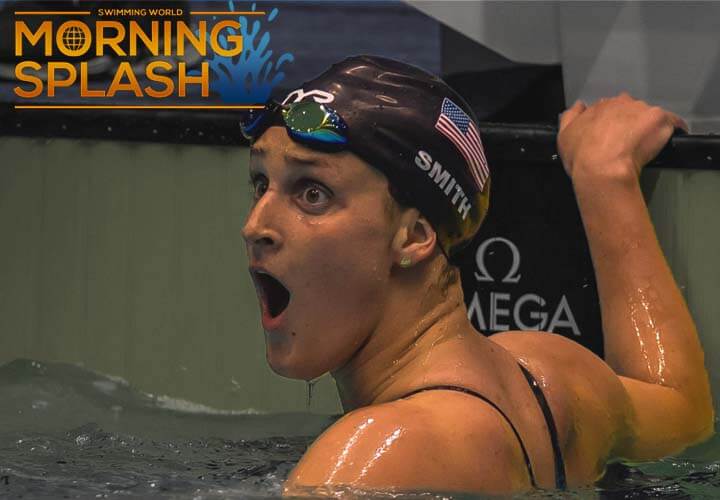
Morning Splash by David Rieder.
Looking back on the five days of racing at U.S. Nationals in Indianapolis, there was no bigger shock performance-wise than Leah Smith posting the world’s third-fastest time on her way to victory in the 400 IM.
Smith was a freestyler who seemingly entered the IM just because she had a break from her typical events—anything freestyle 200 meters or longer—on the meet’s middle day. She promptly dominated, and her time of 4:33.87 would have placed fifth in last year’s Olympic final.
After Maya DiRado’s retirement, the Americans came into the week with no established medal contenders in the 400 IM, but Smith might have found a long-term answer in that event—even if the race at Worlds will come on the final day after an ambitious slate of freestyle racing.
“Whoever knew that Leah Smith was the future of IM swimming?” 2012 Olympic silver medalist Elizabeth Beisel said. “But dude, 4:33 is no joke.”
Where else did the U.S. make big strides this week? Here are four improved areas, plus one where there’s reason to be concerned.
1. Women’s Free Relays
For the first time in years, Australia looks vulnerable in the women’s 400 free relay, as world record-holder Cate Campbell will skip this year’s World Championships. And for the first time ever, the Americans have two swimmers capable of going under 53 in Olympic gold medalist Simone Manuel and national champion Mallory Comerford.
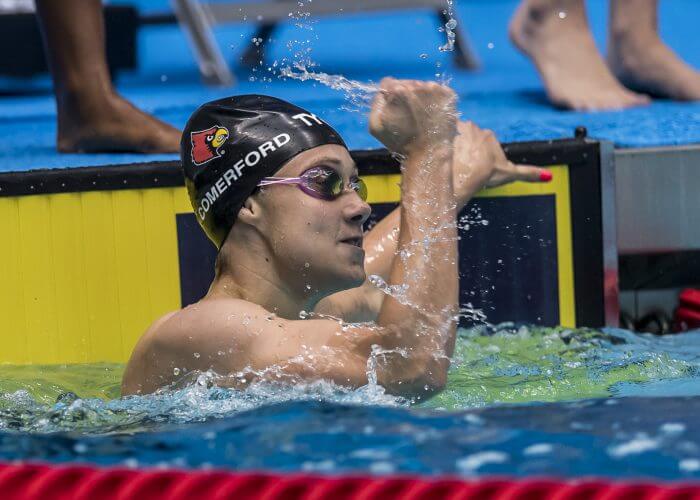
Photo Courtesy: Peter H. Bick
On top of that, both Lia Neal and Kelsi Worrell swam under 54 at Nationals, and Katie Ledecky should be capable of returning to the 52.7-range splits that she posted last summer at the Olympics.
As for the 800 free relay, any American squad has a huge advantage as long as Ledecky is around, but the composition of this year’s team looked up in the air with Allison Schmitt, Missy Franklin and DiRado all absent. But with Smith, Comerford and Melanie Margalis all under 1:57 at Nationals and Manuel at 1:57.1, anything besides a gold medal in this relay would be a stunner.
2. Men’s Butterfly
The (second) post-Phelps era got off to a blazing start this week in Indianapolis as the winning times in both the 100 and 200 fly were faster than Phelps swam to win both events at Olympic Trials last summer.
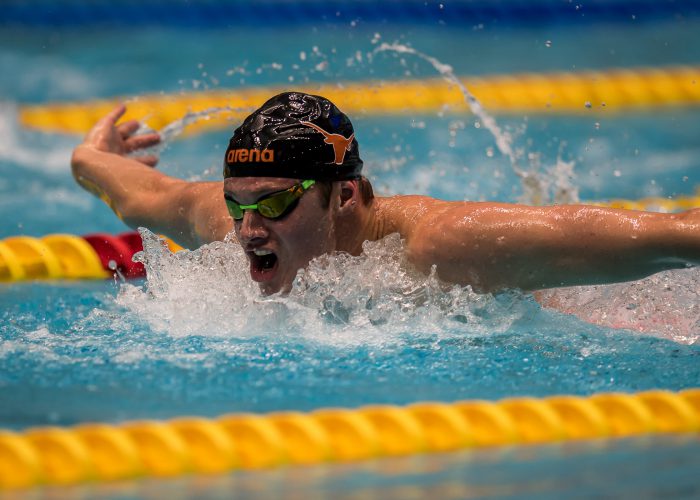
Photo Courtesy: Peter H. Bick
Jack Conger and Pace Clark should certainly be able to make the World Championship final in the 200 fly should they repeat their 1:54-mid form, although it will likely take quicker to chance after a medal. But given how the American presence in the event outside of Phelps has basically been nil for years, that’s a solid step.
And then in the 100 fly, Caeleb Dressel dropped the fastest time in the world at 50.87, and that’s a time that certainly could be medal-worthy come Budapest. Plus, a split like that would be significant for a U.S. men’s 400 medley relay that figured to suffer from Phelps’ absence.
3. Women’s 200 Back and Breast
Remember how the U.S. was lacking in the women’s 200s of stroke, particularly with DiRado and Cammile Adams both absent? Well, the picture in the 200 fly still doesn’t look great, with the No. 1-ranked American (Hali Flickinger) ranked only tenth in the world coming out of Nationals.
But in the 200 back and 200 breast, Nationals produced results that suggest medal-contending swims to come at Worlds. Kathleen Baker proved her mettle in the longer backstroke event with the fastest time in the world at 2:06.38, while 15-year-old Regan Smith will get some top-level experience this summer after qualifying in the second spot.
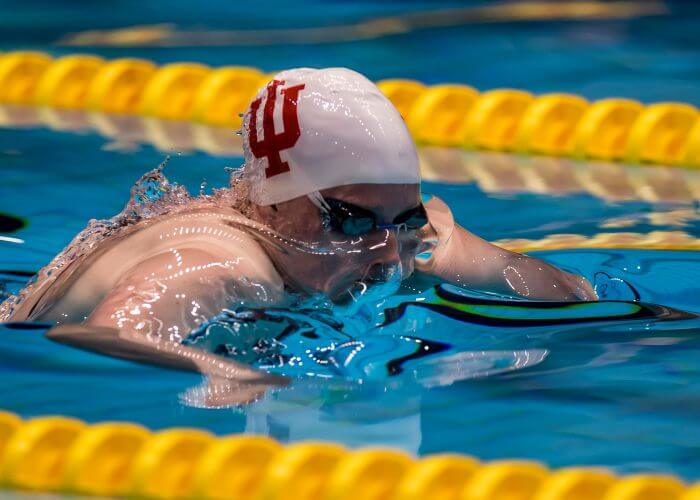
Photo Courtesy: Peter H. Bick
And then in breaststroke, no American broke 2:24 last year. At Nationals, Lilly King won the event in 2:21.83, and Bethany Galat was second in 2:22.24. King, a natural sprinter, finally mastered a race plan to successfully navigate the four-lap race, while Galat qualified for her first international team after twice finishing third at Olympic Trials.
The women’s 200 breast was the only swimming event in Rio where the U.S. did not have at least one finalist. This year, winning a medal seems much more likely than missing the final altogether.
4. Men’s Mid-Distance/Distance
Okay, so it’s still not a given that there’s an American finalist in the 1500 free this summer at Worlds, but there’s hope. True Sweetser got under 15:00 for the first time in winning that event at Nationals, and Robert Finke was not far behind. Both rank in the world top-ten going to Worlds, and both are young, so improvement is no stretch.
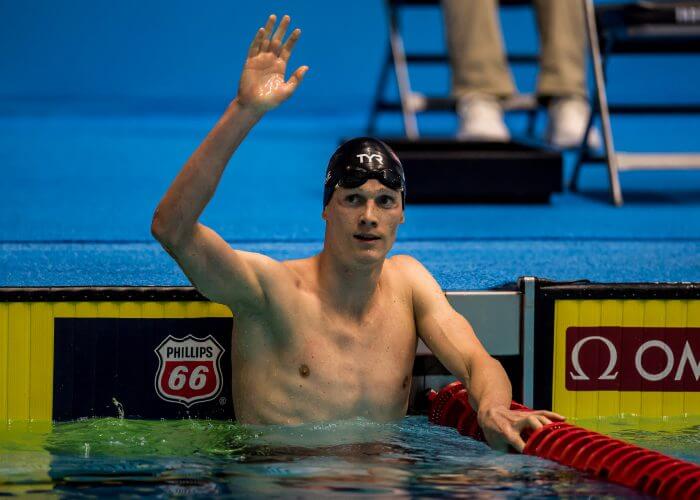
Photo Courtesy: Peter H. Bick
Conor Dwyer finished fourth in the 400 free in Rio and Connor Jaeger was fifth, but neither swam the event at Nationals. (Jaeger is retired.) But Zane Grothe and Clark Smith both look like strong contenders to at least make the final after they moved up to fifth and eighth in the world, respectively, with their efforts at Nationals. The duo also ranks in the world top-ten in the 800 free.
Even in the 200 free, the Americans look set up for a good showing as Townley Haas almost broke 1:44, while Blake Pieroni and Grothe both posted solid 1:46s and Dwyer will provide some veteran stability. Even without Phelps and Ryan Lochte, the American men’s 800 free relay won’t roll over easily.
Concerns in Men’s 100 Back?
Okay, maybe it’s a stretch to say the Americans have issues in an event where they will be represented by the two most recent Olympic gold medalists, Matt Grevers (2012) and Ryan Murphy (2016). Murphy also holds the world record in the event at 51.85.
The duo actually heads into Worlds ranked second and third in the world, respectively. It would be a shocker if at least one of them does not win a medal come Budapest. But gold? That won’t be easy, not after China’s Xu Jiayu almost broke Murphy’s world record earlier this year, posting a time of 51.86.
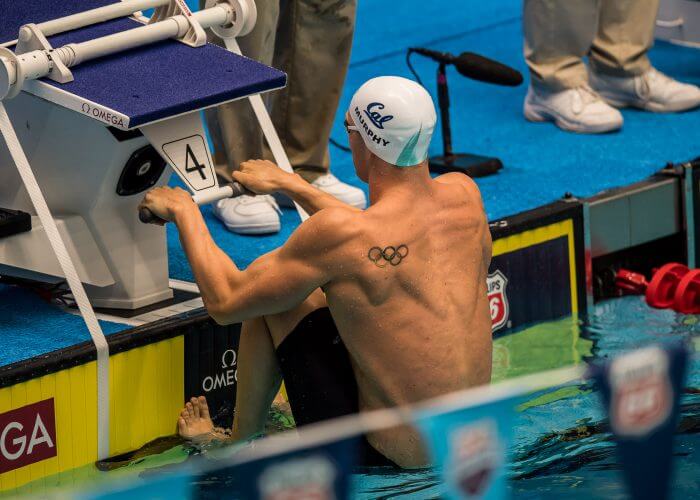
Photo Courtesy: Peter H. Bick
It would be foolish, of course, to count the two Americans out, given their credentials, but they will have to swim much, much faster than they did at Nationals to be in the hunt. Grevers’ 2017 best is 52.71, and Murphy’s is 53.02. In comparison, Murphy entered the Rio Olympics with a 52.26 season best, and he had already been 52.76 before Olympic Trials.
Regardless of Murphy’s times from Nationals, Cal men’s coach and U.S. World Championships head coach Dave Durden is not concerned about his star backstroker.
“He’s still the world record-holder, he’s still the defending Olympic gold medalist, and he’ll have that title until someone takes it away from him,” Durden said. He’ll do what he needs to do going into Budapest to be good for Team USA.”
Will it be enough to win gold in the 100 back? Still to be determined.
All commentaries are the opinion of the author and do not necessarily reflect the views of Swimming World Magazine nor its staff.




A Furry ‘Furriner’s rough summation of how I see US prospects in Budapest
Relays: Clear favourites in all Olympic relays except M4X200 & W4X100 and those I’d weigh them as narrow favourites. Hard to judge just how seriously other major nations will take mixed relays given Olympic announcement came after most nations had concluded selections but US has to be seen as overwhelming favourites in both
Men: Very much in medal picture in both sprint FS and a chance of 1-2 in 100 but suspect Scott may have something to say. Similarly in the mix in both 200 & 400, gold chances better in 200. Realistically needing significant time drops to contend in both 800 & 1500 although Italians aside, standards rather poor this year. US hegemony may be under threat in M back, could still win 2 but no sure bets. In medal pictures in M BRS but most likely playing for minor coin. Gold chances in 50/100fly, minors at 200. Kalisz v much in title hunt in both IMs but stronger gold chance at 400
Women: Could contend for minor medals at both 50/100free but barring illness/injury SS unlikely to be thrown. 200 -1500 = Ledecky show, chance of 1-2 400-800 w Smith. Baker v much in gold hunt 100/200back but both races v fluid re contenders. King v much in the gold picture 50/100BRS but Efimova likely to have something to say. 200 minor coin rather than gold. Minor medal chances 50/100 fly but same scenario as 50/100free re SS. Probably needing 1 – 1.5sec drop to contend 200fly. Legitimate minor medal chances 200-400IM.
We don’t disagree on a whole lot, although this might be a tad more optimistic from a U.S. standpoint than my picks (coming soon!) will be. Americans set up very well outside of the men’s distance and women’s 200 fly. This won’t be Kazan, for sure.
What I’m seeing is that USA is coming through this transitional year in a much stronger position than many of their major competitors. Some, like CAN women, I expect to bounce back from what is probably a quieter year than hoped for to be possibly USA’s peak competition as regards overall strength on the women’s side. Likewise, I see JAP continuing to broaden its breadth of competitive events. CHN will always be X factors. Conversely, FRA may be looking at a couple of “down” cycles and AUS is facing not only the impacts of Rio on its current crop of swimmers but decreasing $$$ and an ever narrowing demographic base from which to draw talent from. Some outstanding individuals may still find intl (maybe even Olympic success) but overall medal hauls will be much reduced for at least the medium term.
I still want to see how this current crop of Australians rebounds from Rio. I think there’s a definite shot for that to happen. France, there will be some rough times coming up. No men’s 400 free relay at Worlds is a big step back after making every podium since ’07.
Dave, regrettably I’m not seeing too many of AUS’s Rio “casualties” rebounding either this year or at any time. Nor has there been an inflow of young talent really pushing their seniors for national team selection; rather we see a lot of the same old faces who’ve been around for some years “just marking time” rather than going anywhere.
The only strong relay medal chance is the W4X100 but without C1 they are vulnerable and may even be scratching to snag bronze. W4X200 has been decimated and beyond McKeon, you’re talking 1.57high; they’ll be scrapping for bronze at best. W4XMED really needs the middle legs to stand up otherwise any medal is debateable. Don’t know if they’ll field mixed relays but minor coin at best. No Chalmers renders M4X100 from potential threat to US to outer lanes of the final. M4X200 has no major hitters, bronze at best. M4XMED – Larkin’s decline and no sub minute breaststroker most likelydeals them out of any medals.
Rio casulaties:
-C1’s race showings post Rio have probably only reinforced what went wrong in Rio. Any way back .. dunno
-C2’s issues aren’t psychological but physical. Her shoulder remains problematic and she really needs to take the time out to get it sorted. Not sure she has the WR capacity of big sister but fit, she’s still prob a player at 100
-Larkin’s showings post Rio = tres ordinaire. Took a v long break and yet to look switched on. May return to previous levels but it won’t be this year
-Seebohm HAS bounced back performance wise this year but is unlikely to swim through to Tokyo. Expect her to retire next year
-McEvoy is a major question mark. Has always been inconsistent esp at 200. Needs to show that he can perform when it really counts rather than just domestically. Ordinary at Mare Nostrum
-Horton is either very good or very ordinary, no middle ground. Has Rio 400 gold but yet to show he’s the real thing at 1500
– Chalmers was a Rio success story but his recent heart surgery is a “Take no.2” at fixing the issue. Time will tell
– McKeonE’S international form-line is one of someone who runs hot and cold even at the same meet. Has the potential to medal at 100/200free & 100fly but never seems to have more than one fully firing at the same big meet
– McKeown regrettably is someone who tends to break down when the pressure is on, be it an Olympic final or a relay
– Bohl was seen in the lead-in to Rio as AUS big future W BRS hope but imploded completely. No signs of any recovery since
A couple of possible new names that could make the grade but cautionary notes on all is that Budapest will be their first senior national team and that can play out any number of ways. Some are still quite some way from real intl competitiveness.
These are Cartwright (M100FR), Wilson (M200BRS), ,Lewis (M200IM), Jack (W4X100), Titmus (W400/800), McKeown Jr (W200BK), Hansen (mature age – W100BRS). Atherton (2X 2015 World Jr Wback champ) has been seen as the heir to Seeobhm but crashed and burned at Aus Trials, thankfully rebounded on subsequent intl outings.
omg..stop hyping Leah Smith…..she’s going to do what she’s always done….2nd places in the frees behind KL and a gold in the relay???? she has 0 chance of beating hosszu in the 400IM…so why is everyone losing there minds….oh shes swimming more than Ledecky..etc….who cares….when the worlds are over shes still going to be OK swimmer Leah Smith…not a Legend…just saying
No, Smith probably won’t win the 400 IM. But she could win a medal. Who would have ever thought that a few weeks ago? It wasn’t even clear if the Americans would send a medal contender to Budapest. Now, Smith is definitely that, even if the race coming on the last day means she could be worn down from a long week.